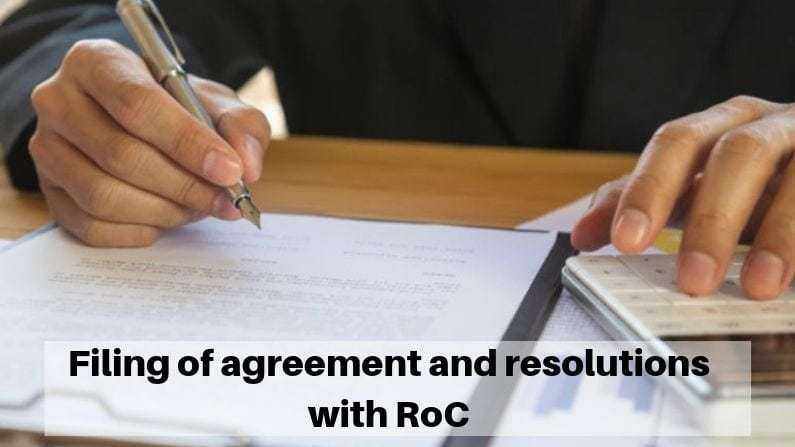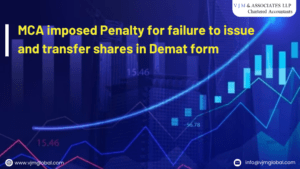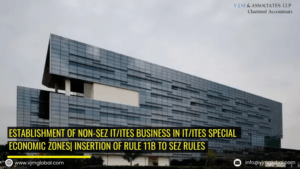Registrar of Company (“RoC”) is a body governing companies and is liable to keep all data and information related to the companies in form MGT-14 E form.
Accordingly, every company is required to inform Registrar of Company (“RoC”) about major actions taken by the company either through passing of any resolutions (at Board meeting or Member’s meeting) or by entering into any agreement.
To comply with same, Section 117 of the Companies Act, 2013 (“The Act”) contains provisions which require companies to file various agreement or resolutions (passed at Board Meeting/Shareholder’s Meeting) with RoC.
1. Filing requirement of Section 117
Section 117(1) of the act states that whenever a company passes any resolution or enters into any agreement then such company is required to file copy of such resolution or agreement with RoC within 30 days of passing of such resolution or date of entering into such agreement.
Copy of resolution should be filed with explanatory statement* if annexed to the notice of calling the meeting in which resolution is proposed.
1.1 *Meaning of Explanatory statement
Explanatory statement is defined u/s 102 as a statement which describes material facts about each item of special business which is to be transact in general meeting such as:
- financial or otherwise interest of any of the following persons in respect of special business, if any, in respect of each items of—
- (i) every director and the manager, if any
- (ii) every other key managerial personnel; and
- (iii) relatives of the persons mentioned in sub-clauses (i) and (ii);
- any other information and facts that may help the member to understand the meaning, scope and implication of business in a better way to take decision thereon.)
2. Resolutions or Agreement to be filed u/s 117
Section 117 doesn’t require company to file every resolution or agreement with RoC rather Sub-section (3) of section 117 mentions list of nature of resolutions required to be filed with RoC, which is as follows:
- Special Resolutions
- Any resolution which is required to be passed as special resolution to become effective. However, such resolution is passed by all members of the company.
- Any resolution passed by the Board of Directors (“BoD”) or any agreement entered into by the company in relation to:
- Appointment of Managing Director
- Re-appointment of Managing Director
- Renewal of appointment of Managing Director
- Variation in terms of appointment of Managing Director
- Any resolutions or agreements which is required to be passed by a specified majority or in a particular manner to make effective. However, such resolution is agreed to by any class of members. Further, all resolutions or agreements which effectively bind such class of members though not agreed to by all those members; (@sachin please rephrase this point)
- Any resolution which is passed requiring a company to be wound up voluntarily in pursuance of section 59 of the Insolvency and Bankruptcy Code, 2016.
- any other resolution or agreement as may be prescribed and placed in the public domain.
Further, in exception, banking company is not required to inform RoC about those resolutions which are passed to grant loans or give guarantees or provide securities in respect of loans in ordinary course of business.
3. Manner of Filing of Resolution or Agreement with RoC (Section 117 of the act read with Rule 24 of The Companies (Management and Administration) Rules, 2014)
As per Section 117(1) of the act read with Rule 24, Company shall file required resolutions or agreement with RoC in form MGT-14 within 30 days from the date of passing of resolution or date of entering into agreement.
4. Documents to be filed alongwith MGT-14
While filing MGT-14, company is required to attach following documents to the form:
- Copy of resolution passed or agreement entered into about which company is filing MGT-14.
- Explanatory statement (if any, issued u/s 102 of the Act alongwith notice calling the meeting in which resolution is proposed)
- If any article has effect of altering the articles of the company then alongwith copy of resolution such company is required to attach the copy of articles issued after passing of the resolution. Same is applicable in case of agreement also.
5. Major Contents of form MGT-14
- Corporate Identification Number (“CIN”) of the company
- Name, address of registered office and e-mail id of the company will auto-populate after entering CIN.
- Registration of document-Resolution/Agreement/Postal Ballot Resolution(s) under section 110/proposed resolutions u/s 94(1)
- Date of dispatch of notice for passing resolution
- Date of passing of resolution
- Number of resolution(s) for which the form is being filed (Company can file maximum 10 resolutions in a single form. Details of any more resolution can be provide through optional attachment)
- For every resolution company is required to provide following details:
- Section of Companies Act, 2013 under which resolution is passed (System will automatically display section under which resolution is passed based on purpose of passing resolution)
- Section of Companies Act, 1956 under which resolution is passed (System will automatically display section under which resolution is passed based on purpose of passing resolution)
- Purpose of passing resolution
- Subject Matter of resolution
- Whether resolution is passed by postal ballet
- Authority passing the resolution (Board of Directors/Shareholders/Class of shareholders/creditors)
- Whether resolution is passed as ordinary or special resolution or with requisite majority
- In case of alteration of object clause, whether there is any change in the industrial activity of the company.
- In case of voluntary winding up company, following details should be provided:
- Select mode of winding up
- Date of commencement of winding up shall be the date of passing resolution
- Enter name, PAN, address of liquidator (details of maximum 2 liquidators can be provided)
- Enter details of agreement (Detail of only one agreement can be entered)
- Enter SRN of INC-28 (In case any of the resolution(s) is passed for alteration in object clause, and there is delay in filing of the form, this form cannot be filed unless eForm INC-28 for condonation of the delay has been filed. In such case, enter the service request number (SRN) of eForm INC-28 filed for condonation of delay.)
6. Legal Fee for filing form MGT-14 E Form
The amount of legal fee to be paid along with form MGT-14 E form is based on share capital of the company. Following is the fee structure based on share capital:
| Share capital | Fee Applicable |
| Less than INR 1,00,000 | INR 200 per document |
| 1,00,000 to 4,99,999 | INR 300 per document |
| 5,00,000 to 24,99,999 | INR 400 per document |
| 25,00,000 to 99,99,999 | INR 500 per document |
| I,00,00,000 and above | INR 600 per document |
However, in case of company without share capital, fee applicable is INR 200.
7. Additional Fee in case of delay in filing of form MGT-14 E form
Additional fee depends on number of days delayed in filing of MGT-14, which is as follows:
| Delay | Additional Fee |
| Upto 30 days | 2 times of normal fee |
| More than 30 days and up to 60 days | 4 times of normal fees |
| More than 60 days and up to 90 days | 6 times of normal fees |
| More than 90 days and up to 180 days | 10 times of normal fees |
| More than 180 days | 12 times of normal fees |
In case of an IFSC company, the additional fee shall be applicable only after the expiry of 60 days of the event date. However, after expiry of 60 days, additional fee will be computed considering 30 days time limit.
E.g., in case of an IFSC Company, brief facts of dats:
- date of event – 1st May, 2019.
- due date of filing of MGT-14 E form- 30th June, 2019 (1st May, 2019+ 60 days).
- Date of filing of MGT-14 E form- 3rd July, 2019
Accordingly, additional fee on MGT-14 e form shall be computed considering delay of 33 days.
8. Penalty in case of delay in filing of MGT-14 (Section 117(2) of the Act)
8.1 Penalty applicable on defaulting company
Any company fails to file the resolution or the agreement within 30 days, such company shall be liable to a penalty of INR 1,00,000. Further, in case of continuing failure, further penalty of INR 500 for each day during which such failure continues shall be levied subject to a maximum of INR 25,00,000.
8.2 Penalty on officer in default
In addition to the above, every officer of the company who is in default including liquidator of the company, if any, shall be liable to a penalty of INR 50,000 and in case of continuing failure, with further penalty of INR 500 for each day during which such failure continues, subject to a maximum of INR 5,00,000






